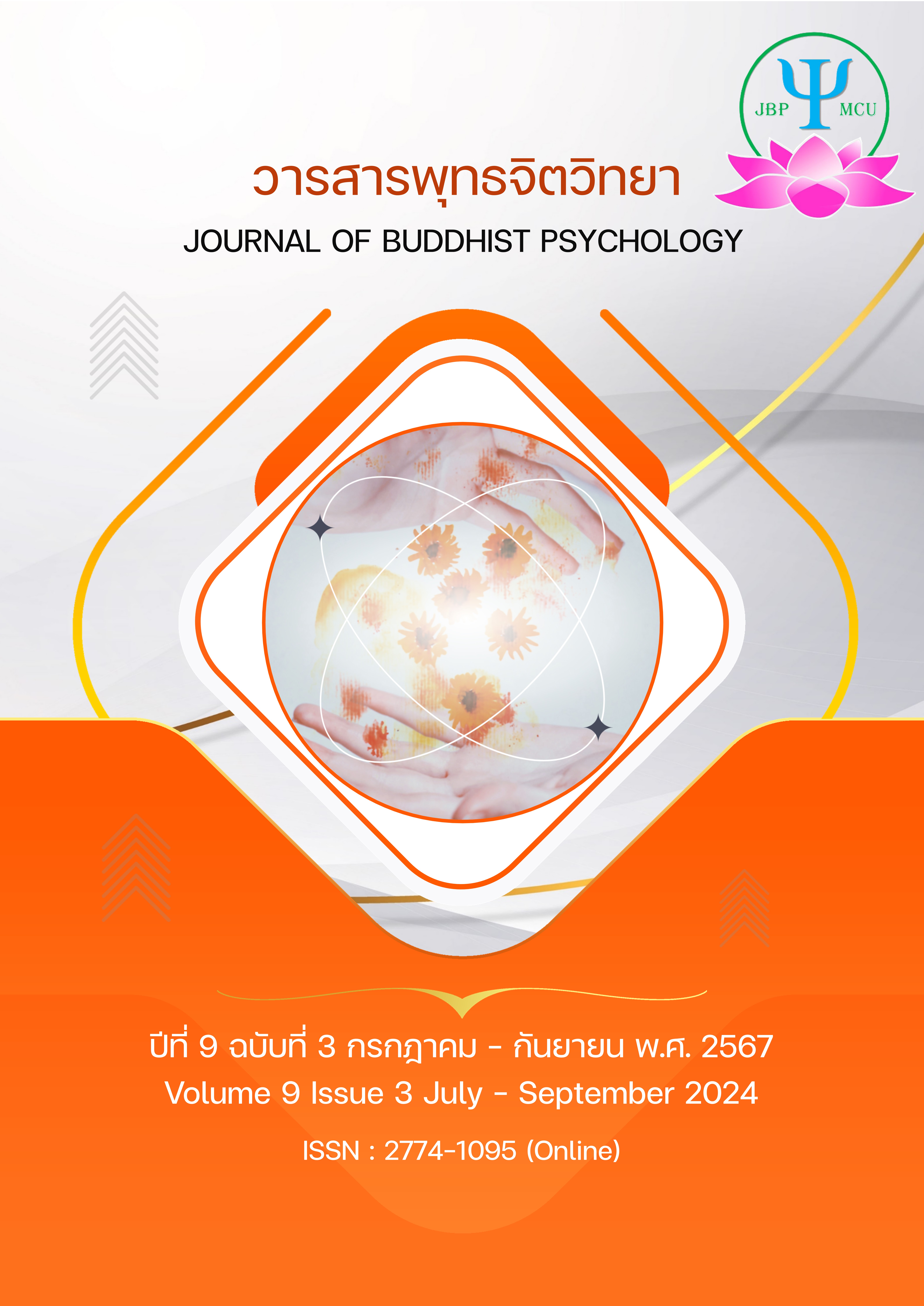การเพิ่มคุณค่าของชีวิตด้วยจิตคิดบวก
Main Article Content
บทคัดย่อ
การเพิ่มคุณค่าของชีวิตด้วยจิตคิดบวก สภาวะจิตเชิงบวกตามแนวพุทธจิตวิทยาการคิดเชิงบวกเป็นตัวแปรที่บ่งบอกถึงการมีสุขภาพทางกายและจิตที่ดีของบุคคล เป็นกระบวนการทางสภาวะจิตที่เกิดจากการรับรู้แปลความหมาย ไปในทางที่ดีเน้นการฝึกฝนจิตใจให้คิดแต่เรื่องดี โดยเรื่องของความจริงและการเพิ่มคุณค่าของชีวิตโดยนำหลักพุทธศาสนาจะซึ่งความสำคัญกับการเจริญปัญญาควบคู่กับการเจริญสติด้วยหลักธรรมวิหาร 4 เป็นการฝึกจิตดีและถูกต้องเหมาะสม ดังนั้นความสำคัญของการเพิ่มคุณค่าของชีวิตด้วยจิตคิดบวกเป็นการหามุมมองที่เป็นบวก มีแง่คิดที่ดี มุมมองที่ทำให้เรามีกำลังใจ กระบวนการของไตร่ตรองความจากจิตที่ดีจากภายในตนอย่างลึกซึ้งด้วยพลังแห่งสติและสัมปชัญญะจะสามารถสร้างพลังความเชื่อมั่นและศรัทธาที่ถูกต้องภายในจิตใจมีวิริยะความเพียรพยายามน้อมจิตให้มีความคิดดีอยู่เสมอมีสมาธิในการมุ่งมั่นตั้งใจและมีพลังแห่งปัญญา เพื่อจัดการกับการเพิ่มคุณค่าของชีวิตด้วยจิตคิดบวกเพราะฉะนั้น ถ้าสามารถคิดในเชิงบวกได้ตลอดเวลาแปลว่าสามารถมีชีวิตอยู่ในสังคมได้อย่างมีคุณภาพและความสุข
การคิดเชิงบวก มีชีวิตที่ดีงามและมีความสุขความคิดเชิงบวกเป็นทักษะของมนุษย์ที่เพิ่มประสิทธิภาพในการสร้างสรรค์ผลลัพธ์ในทิศทางที่ดีโดยยอมรับสภาพปัญหาที่เกิดขึ้นตามความเป็นจริงต้องรู้จักแยกแยะตัวความคิดให้พิจารณาถึงคุณประโยชน์และโทษของความคิดนั้นปัญหาทุกอย่างมองให้เป็นคุณค่าในการพัฒนาตนเองและเป็นแนวทางเรียนรู้สิ่งใหม่ ๆ ที่เป็นประโยชน์มองวิกฤตเป็นโอกาสสู่ความสำเร็จการจิตเชิงบวกตามแนวพุทธจิตวิทยาด้วยการเจริญปัญญาจนรู้แจ้งได้ด้วยตนเองและเข้าถึงเป้าหมายการดับปัญหาที่แท้จริงของชีวิตในอริยสัจสี่และมรรคมีองค์ 8
Article Details

อนุญาตภายใต้เงื่อนไข Creative Commons Attribution-NonCommercial-NoDerivatives 4.0 International License.
เอกสารอ้างอิง
นิภา แก้วศรีงาม. (2547). ความคิดเชิงบวกพึงคิดว่าทุกปัญหามีทางออกไม่ใช่ทุกทางออกเป็นปัญหา.วารสารวงการครู, 1(12), 76-78.
ประกายดาว บุญมี. (2552). ผลของโปรแกรมการปรึกษาเชิงจิตวิทยาแบบกลุ่มตามแนวคิดพิจารณาเหตุผลอารมณ์และ พฤติกรรม ต่อความคิดเชิงบวกของเยาวชนในศูนย์ฝึกและอบรมเด็กและเยาวชน
(สารนิพนธ์วิทยาศาสตรมหาบัณฑิต). มหาวิทยาลัยเชียงใหม่
พระเทพดิลก (ระแบบ ฐิตญาโณ). (2547). ศาสนากับสันติภาพ. กรุงเทพฯ: แปดสิบเจ็ด ๒๕๔๕.
พระมหามงคล สารินทร์, เรือเอกอภิธีร์ ทรงบัณฑิตย์ และสมชาย เทพแสง. (2556). การบริหารงานตามแนวพุทธธรรม. วารสารบริหารการศึกษา มศว, 10(19), 84-88.
พีล, นอร์แมน วินเซนต์. (2566). พลังความคิดที่ยิ่งใหญ่พลิกสู่ชัยชนะอย่างน่าทึ่ง.พิมพ์ครั้งที่ 1. กรุงเทพฯ: แอร์โรว์.
ไพเฟอร์ เวร่า. (2548). การคิดแง่บวก. แปลโดย นุชจรีย์ ชลคุป. กรุงเทพฯ: บลิส.
ยุทธนา ภาระนันท์. (2554). อะไร ๆ ก็บวกได้ ด้วยพลังสมองยิ้ม. กรุงเทพฯ: กรุงเทพธุรกิจ.
สมเด็จพระพุทธโฆษาจารย์ (ป.อ. ปยุตฺโต). (2557). พุทธธรรมฉบับปรับขยาย. (พิมพ์ครั้งที่ 40). กรุงเทพฯ:ผลิธัมม์.
สุวรรณี ไวท์, สิริวัฒน์ ศรีเครือดง และสุวัฒสัน รักขันโท. (2564). พุทธจิตวิทยากับการพัฒนาตนให้มีความสุข.วารสาร มจร มนุษยศาสตร์ปริทรรศน์,7(1), 425-440.
เอ็ดเวิร์ด เดอ โบโน. (2547). การคิดแนวกว้าง. กรุงเทพฯ: เอ็กซเปอร์เน็ท.
Paul, R. (1993). Teaching Critical Thinking. California: Center for Critical Thinking and Moral Critique.


